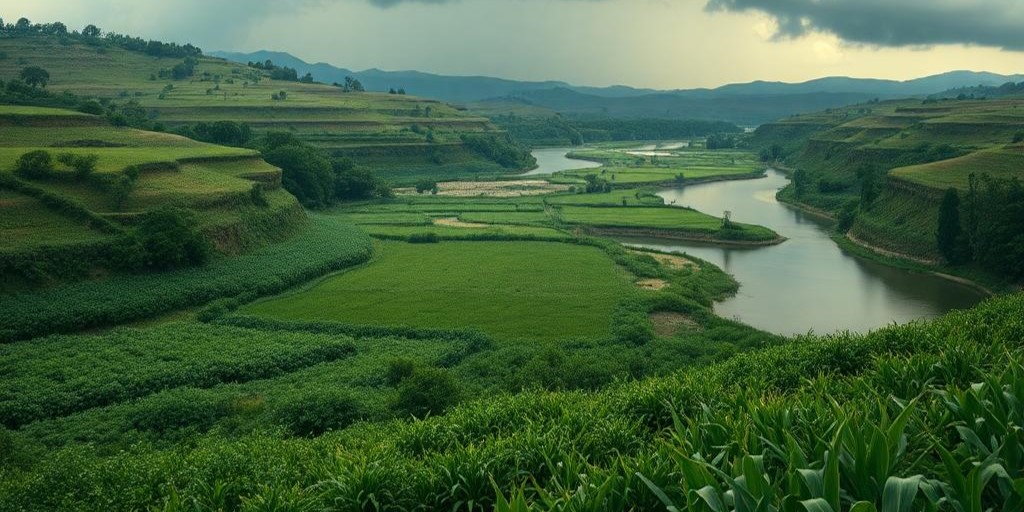Introduction: Climate as the Hidden Architect of History
When we flip over the pages of history, it would be seen
that various causes lie behind the rising and the falling of every empire.
Nevertheless, that very factor which has gone unidentified but played the most pivotal
role in the ascents of empires remains untold—climate.
Climate not only affects the natural environment, but also
has a huge influence on lifestyle, agriculture, economy, and political
structure of empires. Strong empires have emerged according to natural balance
and have also crashed because of the absence of that balance.
In this article, we will see in detail how climate
influenced the emergence and decline of ancient and modern empires.
Ancient Egypt: The Nile River and Fertile Land
Ancient Egyptian civilization had its base established
through the blessings of the Nile River. Annual flooding by the Nile River
provided the central reason behind Egypt's agriculture, economy, and empire
development.
Positive effects of climate
Yearly floods: Every year, the Nile would
flood and deposit fertile silt on the surrounding land, it played an important
role in crop production.
Crop production: This continuity in crop
production made Egypt an economic giant.
Trade and commerce: The supply of crops
helped Egypt maintain the leading position in local as well as international
trade.
Negative impact of Climate
Drought and Lack of Rainfall: The
long-drawn drought and the absence of flooding of the Nile River, occurring
around 2200 BC, became one of the factors for the downfall of the ancient
Egyptian dynasty.
Internal strife: Food scarcity caused political turbulence in Egypt.
Mesopotamia: Role of Tigris and Euphrates
The Mesopotamian society is referred to as the "Fertile
Crescent." It begins between the Tigris and the Euphrates rivers, where
the first farming and city-based civilizations emerged.
Benefits of Climate
River alluvion: River alluvion changed
agricultural productivity in the region.
Agriculture and Population Growth: The
abundance of food through improved agriculture helps Mesopotamia to grow in
population and develop cities.
Negative aspects
Soil salinity: Agricultural cultivation
over a very long period of time also increased soil salinity.
Drought: Climate change also resulted in
drought and changes in river flow. This was one of the many reasons for the
fall of Mesopotamia.
Roman Empire: Stable climate and expansion
The Roman Empire was established as one of the biggest
empires in the world. However, an underlying reason for their success is the
stability of the climate.
Role of climate in the success of the Romans
Warm weather period: From 200 BC to 150 AD,
the Mediterranean region experienced warm and stable weather. This allowed for
increased agricultural production and economic prosperity.
Fulfilling grain production needs: The
Roman Empire possessed vast arable land that aided the production of grain.
Causes of decline
Climatic change: During the third century,
cold weather set in Europe. This change influenced food production and created
a food crisis.
Pestilence and Famine: Bad weather caused famine and disease that undermined the Roman Empire.
Mongol Empire: Nature Adjustment
The Mongol Empire, one of the largest unified empires in
history, expanded by taking advantage of the climate.
Positive Effects of Climate
Wet Period: In 1200 AD, the Wet Period
began in the steppe region of Asia, which increased pastures for raising
horses. The Mongols' military power increased in this.
Expansion: Their adaptive abilities and
environmental advantages helped them expand their empire rapidly.
Negative Effects of Climate
Dry Period: The following dry weather led
to a scarcity of food, and the growth of the empire became slow.
Mayan Civilization: Rainfed Agriculture
The Maya civilization developed in Central America, where
sufficient rainfall supported their agriculture.
Reasons for Growth
Rainfall: There was enough rain so that the
Mayan civilization could continue producing food.
Rivers and reservoirs: They used advanced
technology to conserve water.
Reasons for Decline
Severe drought: A severe drought during 800
to 1000 AD lowered their food yield.
Political instability: Shortage of food and
water created greater social and political unrest.
The Inca Empire: Mountainous climate
The Inca Empire was built in the Andes Mountains. Despite
the altitude and harsh environment of these mountain ranges, they adapted to
the climate and built powerful empires.
Good features
Irrigation systems on the mountain slopes:
The Incas managed to produce food successfully due to irrigation systems
developed on mountain slopes.
Huge stores of food: They developed food
storage techniques, which helped them at the bad times.
Destructive factors
Climate change: Their agricultural
activities were interfered with by long periods of cold weather and reduced
rates of snowmelt.
Famine: Their food scarcity and the impacts
of cold weather led to their collapse.
Role of climate in the contemporary world
Climate is still playing a very significant role in the
modern world, threatening the sustainability of human civilization since the
industrial revolution, mainly due to carbon emissions and global warming.
Impact of climate change
Impact on food production: Weather
abnormalities and warming are negatively affecting crop production.
Coastal area extinction: Rising sea levels
are endangering the lives of coastal areas and islanders.
Climate refugees: As many people are forced
to leave from their homeland due to climate changes.
Example
Bangladesh: Flooding and river erosion
troubles occur due to climate changes in Bangladesh.
Africa: A food crisis is noticed due to the
prolonged droughts in the Sahel region of Africa.
Conclusion: Learn from history
Climate is never the only factor in an builds empires, but
it is a fundamental and influential factors. History has proved that good
climate builds empires and unfavorable climate leads to their downfall.
We should live harmoniously with nature in this world, where the effects of climate change are intensifying. According to history, the only way to be able to survive is to cooperate with nature and keep its balance.

















0 Comments